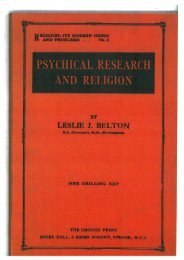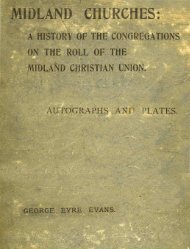Essays in Unitarian Theology by Kenneth Twinn Lindsey - General ...
Essays in Unitarian Theology by Kenneth Twinn Lindsey - General ...
Essays in Unitarian Theology by Kenneth Twinn Lindsey - General ...
Create successful ePaper yourself
Turn your PDF publications into a flip-book with our unique Google optimized e-Paper software.
ESSAYS IN UNITARIAN THEOLOGY<br />
the problem of evil. This was the position of even<br />
sucka non-theist as T. H. Huxley, who, <strong>in</strong> his Rornanes<br />
Lecture of 1893, Evolution and Ethics, repudiated the<br />
cc gladiatorial theory of existence " which he found <strong>in</strong><br />
evolution, and advocated, for human affairs, the<br />
-<br />
reversal of the cosmic process. * The evolutionary<br />
theist, however, is bound to po<strong>in</strong>t out that any such<br />
view ignores the fact that man himself has emerged<br />
from 'the cosmic process. The microcosmic atom (to<br />
A<br />
quote Huxley's phrase), who pronounces the illimitable<br />
macrocosm guilty, is himself the product of the macro-<br />
cosm. This was well emphasized <strong>by</strong> Huxley's grand-<br />
son, Sir Julian, who <strong>in</strong> his Romanes Lecture of 1943<br />
took exactly the same subject as his grandfather had<br />
I<br />
done fifty years previously, and arrived at precisely the<br />
otmosite conclusion. In actual fact, even T. H.<br />
I I<br />
Huxley was not entirely consistent, and <strong>in</strong> the pub-<br />
lished form of his lecture he felt bound to admit that<br />
the ethical process was <strong>in</strong> reality part and parcel of the<br />
evolutionary process.Jr From the theistic po<strong>in</strong>t of<br />
4 A<br />
view, therefore, it can be argued that even such evil<br />
as there may be <strong>in</strong> nature is an <strong>in</strong>evitable part of the<br />
It is not possible [says Tennant] to imag<strong>in</strong>e a liv<strong>in</strong>g<br />
world. <strong>in</strong> which truly ethical values are to be actualized,<br />
save is an evolutionary cosmos <strong>in</strong> which free agents live<br />
and learn, make choices and build characters.$<br />
That - there could be a determ<strong>in</strong>ate evolutionary world<br />
of unalloyed comfort, yet adapted <strong>by</strong> its law-abid<strong>in</strong>gness<br />
to the development of rationality and morality, is a pro-<br />
* See Collected <strong>Essays</strong>, Vol. IX, pp. 8 1-3.<br />
t Collected <strong>Essays</strong>, Vol. IX, Note on p. 1 14.<br />
Philoso~hical <strong>Theology</strong>, Vol. 11, p. 185.<br />
BELIEF IN GOD 39<br />
position, the burden of prov<strong>in</strong>g which must be allotted to<br />
the opponent of theism."<br />
In any case, as Prof. Eric Waterhouse has argued,<br />
the mere fact that man is disturbed <strong>by</strong> evil, is itself<br />
evidence that goodness is the ultimate ground of the<br />
world process.<br />
Whatever way we look at the matter [he writes] it must<br />
appear that the ground of the universe, and of our own<br />
existence, whether we call that ground God or not, has<br />
produced alike both the conditions which allow the appear-<br />
ance of evil and those which condemn and fight aga<strong>in</strong>st it.<br />
If the former appearance of evil is quoted as evidence<br />
aga<strong>in</strong>st the goodness of God, the latter fight<strong>in</strong>g it affords<br />
equally good evidence aga<strong>in</strong>st his moral impotence or<br />
neutrality. Why a be<strong>in</strong>g morally <strong>in</strong>different, to whom<br />
good and bad are alike just phases of the world-process,<br />
should create be<strong>in</strong>gs who are so profoundly affected where<br />
he is neutral, is just as serious a problem as why a good God<br />
who hates evil should permit it.?<br />
It can, of course, be argued, that the basic fallacy of<br />
evolutionary theism lies <strong>in</strong> its bland assumption that<br />
what results from the cosmic process must have been<br />
there from the beg<strong>in</strong>n<strong>in</strong>g. Admittedly, there is no<br />
necessary reason for this, and some such theory as<br />
emergent evolution is a possibility. But everyth<strong>in</strong>g<br />
turns on the question of what is the most satisfy<strong>in</strong>g<br />
explanation of the universe, and evolutionary theism<br />
seems to leave less questions unanswered than any<br />
other theory. And if it be objected that we have no<br />
right to seek for explanations and mean<strong>in</strong>g, we can<br />
only refer to the words of F. H. Bradley : "Metaphysics<br />
may be the f<strong>in</strong>d<strong>in</strong>g of bad reasons for what we believe<br />
* Ibid., p. 201.<br />
i= E. Waterhouse, Philosophical Afikroach to Religion, p. 173.






